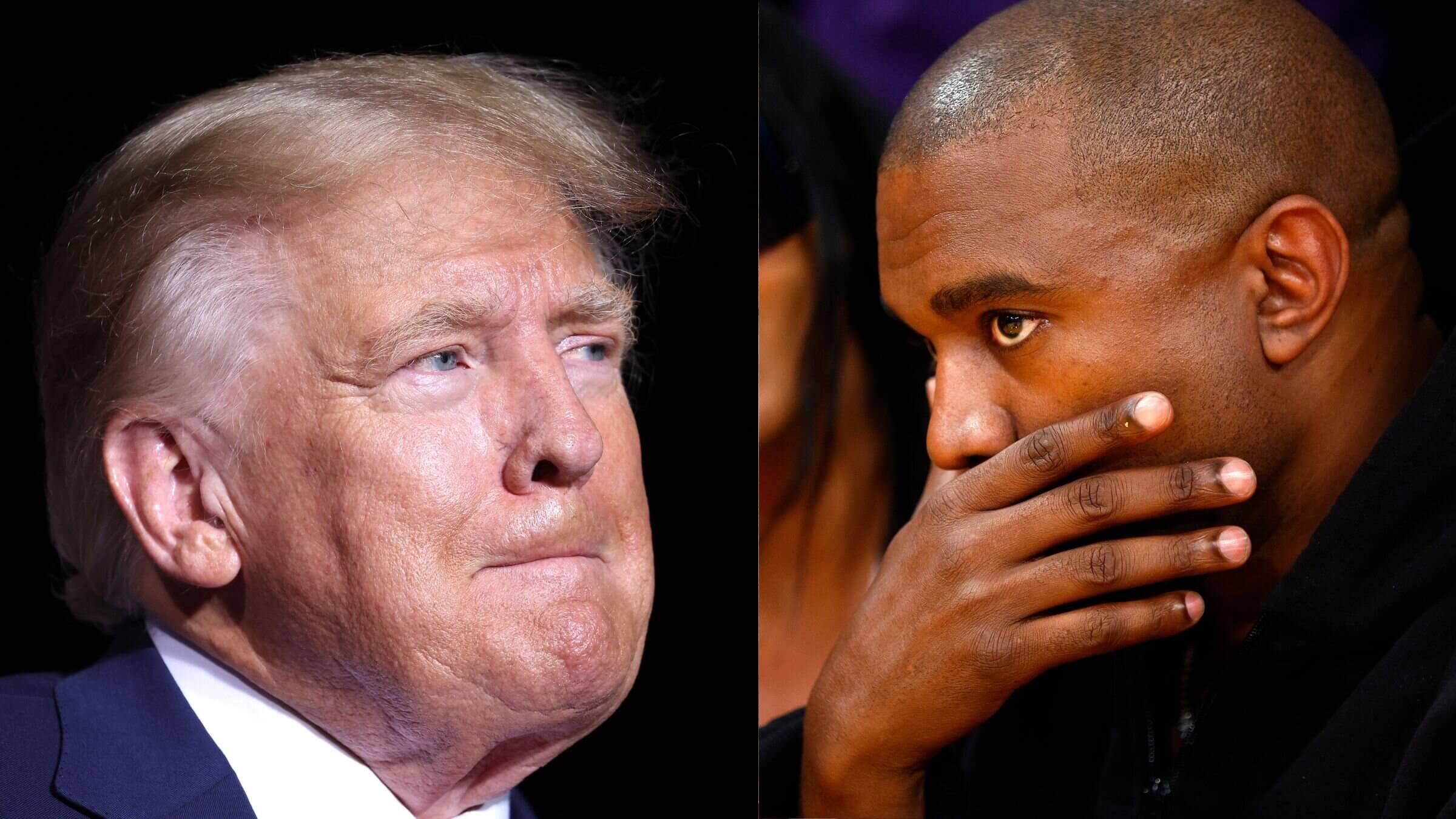‘Never again’ means actually demanding zero tolerance of antisemitic stereotypes
‘It’s time for Jews to stop turning the other cheek’ for acceptance in ‘a world club that doesn’t want us as members’

Former President Donald Trump. Rapper Kanye West, who has legally changed his name to Ye. Photo by Justin Sullivan and Ronald Martinez/Getty Images
There is something sad, verging on tragic, about the Jewish need for validation from people outside the tribe – like the proverbial playground outcast who smiles shyly when the class bully gives him the time of day.
This attitude is manifested in the unctuous delight that is taken when a celebrity or politician or artist is discovered to be Jewish or even half-Jewish — whether it is Madeline Albright, Paul Newman, or Cardinal John O’Connor, the late Archbishop of New York, whose mother was born Jewish and converted to Catholicism. That Jews revel in this slightly puerile sense of pride, after centuries of being discriminated against in both subtle and extreme ways, is not surprising. But the fact remains that it is hard to know what to call this other than an exercise in collective self-abasement.
I have been thinking about this phenomenon for a long time, and it was underscored in the wake of former President Donald Trump’s Mar-a-Lago deplorable dinner with Kanye West and Nick Fuentes. The dinner came a week after Trump got a standing ovation at the gala of the Zionist Organization of America, which awarded him its Theodore Herzl Gold Medallion – an honor previously bestowed upon Winston Churchill, David Ben Gurion and Golda Meir. It is impossible to imagine any of them breaking bread with West, the rapper-turned-philosopher who has made a habit of spouting antisemitic remarks (“death con 3 on Jewish people”) and recently allowed that he sees “good things about Hitler;” or Fuentes, a right-wing white supremacist and Holocaust-denier.
Over the years, some Jews had mistaken Trump’s daughter Ivanka’s marriage to Jared Kushner and conversion to Judaism or his largely transactional and, in some cases, purely gestural relationship with Israel — moving the embassy to Jerusalem — as evidence of philosemitism. For them, his embrace of these two openly antisemitic characters felt like a shocking betrayal. When asked to apologize, an aide responded that Trump “didn’t care.” Jewish Republicans, including several former officials in the Trump White House and the head of the very ZOA that had just given him its highest honor, have been running in the other direction.
The truth, of course, is that Trump will do business with whoever serves his larger purpose, in this case to gain popularity and win votes for his 2024 bid to return to the presidency. And the truth also is that antisemitism, as ever, lurks just beneath the surface – and its cloaked quality makes it even more insidious.
As we have seen over the last decade, the further away we get from the Holocaust, the more brazenly antisemitism shows itself, such that that cloak has finally been thrown off to reveal an abiding hatred that has never gone away. One can speculate about the reasons for this abject reality — envy, an ingrained disdain, an allergy to what is perceived as a Jewish style of communication – but its roots lie deep in history and have culminated in genocide.
The Jewish response until now has been to appease the cultural hatred aimed at us – or to kowtow to anyone, however problematic, perceived as being on our side — instead of fighting it head on. Even Benjamin Netanyahu, the former and future prime minister of Israel — who has positioned himself as the great protector of the Jewish people inside and outside of the Jewish state, and is, whatever his shortcomings, a verbal straight shooter known to call it as he sees it — had only the meekest reaction to Trump’s dinner, referring to it as “a mistake.”
I would suggest that it’s high time for us Jews to stop turning the other cheek in a desperate attempt to be accepted in a world club that does not want us as members. Just as mainstream discourse no longer tolerates racist expressions or tropes, we should demand that same level of scrutiny be applied to the use of Jewish stereotypes with rigorous consistency and force.
We have slid by on a certain attitude of pacific accommodation for far too long, as though a combination of righteous fury and indifference to the reactions of others were too rich a brew for our blood. It’s not as though we’re incapable of putting up a powerful defense: it took the Nazis longer to overcome the resistance of the Warsaw Ghetto than it took them to conquer France.
Then, too, we Jews would be wise to stop pinning our hopes on the by-now hackneyed phrase “Never again.” The bravado that lies behind this rallying cry is thin and, in the worst instance, can only lead to a naïve conviction that we are safe. The message Tom Stoppard conveyed in Leopoldstadt was that the very act of assimilation — of trying to “pass” — is a delusional one, a temporary resolution of an age-old enmity at best.
Jews, lest we forget, are a tiny minority, despite our relative influence and power (which is usually attributed to devious and suspect means). We are a minority that has been vulnerable to a galling prejudice and animus that has thrived for centuries and is re-emerging with ever-growing boldness. When Ken Burns spoke at the 92nd Street Y about his reasons for creating a docuseries about the U.S. response to the Holocaust, he said that he and his team had worked overtime to rush the project out in response to the antisemitic tenor of the times.
“Never again” is, indeed, hollow to the point of meaninglessness if we continue to politely sit on our hands in the face of an alarming rise in overt antisemitism rather than dare to risk public disfavor by raising our fists. Put plainly, history has shown us that it is dangerous to do otherwise.

















